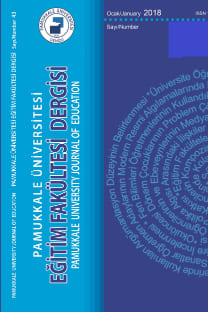Pamukkale Üniversitesi Eğitim Fakültesinde Yaz Okuluna Kayıt Yaptıran Öğrencilerin Başarısızlık Nedenlerinin İncelenmesi
Bu çalışmanın amacı Pamukkale üniversitesi eğitim fakültesinde 2003-2004 eğitim öğretim yıllında yaz okuluna kayıt yaptıran öğrencilerin başarısızlık nedenlerini incelemektir. Araştırmaya farklı alanda öğrenim gören 206 öğrenci katılmıştır. Öğrencilerin başarısızlık nedenlerini belirlemede araştırmacılar tarafından geliştirilen Başarısızlık Nedenleri Anketi kullanılmıştır. Bulgular cinsiyet, öğrenim görülen alan, barınma ve öğrenim görülen alanı tercih etme durumu değişkenleri açısından ele alınmış ve bu değişkenler ile olan ilişkileri incelenmiştir. Araştırma bulguları öğretim elemanları ve yöneticiler açısından ele alınıp tartışılmıştır.
Investigatting the Causes of Academic Failure Among Students that Attends Summer Course at Faculty of Education in Pamukkale University
The purpose of present study is investigated causes of academic failure among the students who attend summer course in Pamukkale University. 206 students from the Faculty of Education in Pamukkale Universty participed to the study. The Causes of Academic Failure Inventory is developed by researchers is used to determine students' causes of academic failure. The Findings are scrutinized point of gender, major field of study, sheltering and chosen major field of study and relationships have been investigated with these variable. Implication of findings are discussed for the lecturers and administrators.
___
- Altenbaugh, R. J. (1998)."Some teachers are ignorant": Teachers and teaching through urban school leavers' eyes. In D. Franklin (Ed.), When children don't learn: Student failure and the culture of teaching (pp. 134-159). New York: Teachers College, Columbia University.
- Anderson, E.,&Keith,T.(1997).A longitudinal test of a model of academic success for at-risk high school students. Journal of Educational Research, 90,259-268.
- Aysan, F., Tanröğen, G. ve Tanrıöğen, A.( ) Perceived Causes of Academic . Failure Among The Students at Faculty of Educatim at Buca, Teacher Training For the twenty First Centruy pp 73-85
- Beck, L., & Murphy, J. (1996). The four imperatives of a successful school. Thousand Oaks, C A: Corwin Press.
- Chen, C., Lee, S., & Stevenson, H. W. (1996). Long-term prediction of academic achievement of American Chinese, and Japanese adolescents. Journal of Educational Psychology, 18,750-759.
- Deschenes, - S., Cuban, L., & Tyack, D. (2001). Mismatch: Historical perspectives on schools and students who don't fit them. Teachers College Record,103,525-547.
- Dimmitt, C.(1996) Transforming School Counseling Practice through Collaboration and the Use of Data: A Study of Academic Failure in High School Professional School Counseling, 10962409, Jun2003, Vol. 6, Issue 5
- Eccles, J. S., Adler, T. F., & Kaczala, C. M. (1982). Socialization of achievement attitudes and beliefs: Parental influences. Child Development, 53, 310-321.
- Henry, D. (2000). Peer groups, families, and school failure among urban children: Elements of risk and successful interventions. Preventing School Failure, 44(3), 97-104.
- Hilty, E. B.(1998). The professionally challenged teacher: Teachers talk about school failure. In D. Franklin (Ed.), When children don't learn: Student failure and the culture of teaching (pp. 134-159). New York: Teachers College, Columbia University.
- Hoge, D., Smit, E., & Crist, J. (1997). Four family process factors predicting academic achievement in sixth and seventh grade. Educational Research Quarterly, 21(2), 27-42.
- House, D. (1999). Self-beliefs and background variables as predictors of school withdrawal of adolescent students. Child Study Journal, 29,247-268
- Kaplan, D. S., Peck, B. M., & Kaplan, H. B. (1997). Decomposing the academic failure-dropout relationship: A longitudinal analysis. The Journal of Educational Research, 90,331-343.
- Luster, T., & McAdoo, H. (1996). Family and child influences on educational attainment: A secondary analysis of the High/Scope Perry preschool data. Developmental Psychology, 32(1), 26-39.
- Marchant, G., Paulson, S., & Rothlisberg, B. (2001). Relations of middle school students' perceptions of family and school contexts with academic achievement. Psychology in the Schools, 38,505-519.
- Marsh, H. W. (1987). The big-fish-little-pond effect on academic self-concept. Journal of Educational Psychology, 79,280-295.
- Marsh, H. W., & Parker, J. W. (1984). Determinants of student self-concept: Is itbetter to be a relatively large fish in a small pond even if you don't learn toswim as well? Journal of Personality and Social Psychology, 47(1),213-231.
- Marsh, H. W., & Yeung, A. S. (1997). Causal effects of academic self-concept on academic achievement: Structural equation models of longitudinal data. Journal of Educational Psychology, 89( 1), 41-54.
- McEvoy, A., & Welker, R. (2000). Antisocial behavior, academic failure, and school climate: A critical review. Journal of Emotional and Behavioral Disorders, 8(3), 130-140
- ISSN: 1301-0085
- Yayın Aralığı: Yılda 3 Sayı
- Başlangıç: 1996
- Yayıncı: -
